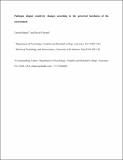Files in this item
Pathogen disgust sensitivity changes according to the perceived harshness of the environment
Item metadata
| dc.contributor.author | Batres, Carlota | |
| dc.contributor.author | Perrett, David I. | |
| dc.date.accessioned | 2020-05-06T23:32:11Z | |
| dc.date.available | 2020-05-06T23:32:11Z | |
| dc.date.issued | 2019-05-07 | |
| dc.identifier | 258897616 | |
| dc.identifier | 1398e19e-174f-4662-a3d6-db21457e0270 | |
| dc.identifier | 85065540202 | |
| dc.identifier | 000469606700001 | |
| dc.identifier.citation | Batres , C & Perrett , D I 2019 , ' Pathogen disgust sensitivity changes according to the perceived harshness of the environment ' , Cognition and Emotion , vol. Latest Articles . https://doi.org/10.1080/02699931.2019.1612735 | en |
| dc.identifier.issn | 0269-9931 | |
| dc.identifier.other | RIS: urn:32FE43391CB19F733E64ACB345419392 | |
| dc.identifier.other | ORCID: /0000-0002-6025-0939/work/64361018 | |
| dc.identifier.uri | https://hdl.handle.net/10023/19890 | |
| dc.description.abstract | Much research has explored behaviours that are linked with disgust sensitivity. Few studies, however, have been devoted to understanding how fixed or variable disgust sensitivity is. We therefore aimed to examine whether disgust sensitivity can change with the environment by repeatedly testing students whose environment was not changing as well as student cadets undergoing intensive training at an army camp. We found that an increase in the perceived harshness of the environment was associated with a decrease in pathogen disgust sensitivity. Our results support the idea that disgust sensitivity is malleable depending on the environment. More specifically, we propose that in a harsh environment, where survival may be more difficult, pathogen disgust sensitivity may decrease to allow the consumption of available resources. | |
| dc.format.extent | 7 | |
| dc.format.extent | 434931 | |
| dc.language.iso | eng | |
| dc.relation.ispartof | Cognition and Emotion | en |
| dc.subject | Disgust sensitivity | en |
| dc.subject | Pathogen disgust | en |
| dc.subject | Sexual disgust | en |
| dc.subject | Moral disgust | en |
| dc.subject | Environment | en |
| dc.subject | BF Psychology | en |
| dc.subject | NDAS | en |
| dc.subject.lcc | BF | en |
| dc.title | Pathogen disgust sensitivity changes according to the perceived harshness of the environment | en |
| dc.type | Journal article | en |
| dc.contributor.institution | University of St Andrews. School of Psychology and Neuroscience | en |
| dc.contributor.institution | University of St Andrews. Institute of Behavioural and Neural Sciences | en |
| dc.contributor.institution | University of St Andrews. Centre for Social Learning & Cognitive Evolution | en |
| dc.identifier.doi | 10.1080/02699931.2019.1612735 | |
| dc.description.status | Peer reviewed | en |
| dc.date.embargoedUntil | 2020-05-07 |
This item appears in the following Collection(s)
Items in the St Andrews Research Repository are protected by copyright, with all rights reserved, unless otherwise indicated.

